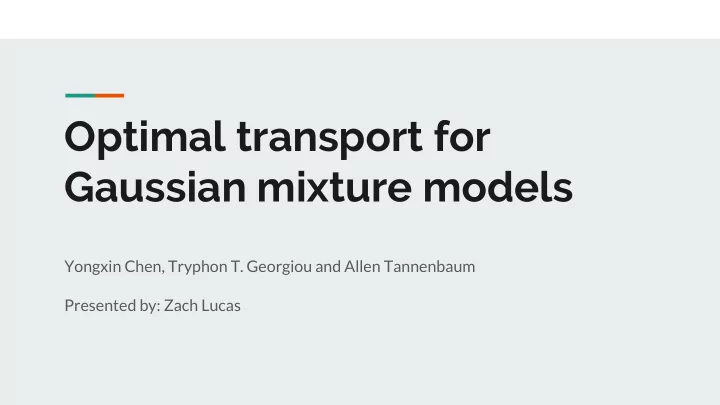

Optimal transport for Gaussian mixture models Yongxin Chen, Tryphon T. Georgiou and Allen Tannenbaum Presented by: Zach Lucas
Intro and Motivation A mixture model is a probabilistic model describing properties of populations with subpopulations. To study OMT on certain submanifolds of probability densities. To retain the nice properties of OMT, herein, an explicit OMT framework on Gaussian mixture models is used. Data is sparsely distributed among subgroups. The difference between data within a subgroup is way less significant than that between subgroups.
Gaussian Mixture Model (GMM) Learning Unsupervised clustering based on naive Bayes
GMM: Expectation - Maximization (EM)
GMM: Expectation
GMM: Maximization
GMM: 2D example https://www.youtube.com/watch?v=B36fzChfyGU
OMT Background
OMT Background: Kantorovich Coupling The unique optimal transport T is the gradient of a convex function
OMT Background: Kantorovich The optimal coupling based on the transport map T in (2), where Id is the identity map. The square root of the minimum of the cost defines a Riemannian metric on , known as the Wasserstein metric . On this Riemannian-type manifold, the geodesic curve is given by Displacement Interpolation
Gaussian marginal distributions Denote the mean and covariance of Let X, Y be two Gaussian random vectors associated with respectively. Our new cost from (1) becomes
Gaussian marginal distributions The constraint is semidefinite constraint, so the (6) is a semidefinite programming (SDP). It turns out that the minimum is achieved by the unique minimizer in closed-form: With minimum value
Gaussian marginal distributions Displacement Interpolation as a Gaussian: Wasserstein Distance can be extended to singular Gaussian distributions
OMT for GMM Space of distributions: We view it as a discrete distribution on the Wasserstein space of Gaussian distributions:
OMT for GMM The discrete OMT problem:
Geodesic
Notes This is due to the fact that the restriction to the submanifold induces suboptimality in the transport plan. d is a very good approximation of W2 if the variances of the Gaussian components are small compared with the differences between the means. Only (9) must be solved to compute a new distance, which is extremely efficient with small distributions
Barycenter of GMM
Barycenter of GMM Solve with fixed point iteration: Remark: unrealistic to solve (14) for more than 3 dimensions for both general and gaussian distributions
Barycenter of GMM Modified problem: Let as a discrete measure on
Barycenter of GMM The optimal v is gaussian. Denote the set of all such minimerzers For some probability vector The number of element N is bounded above by
Barycenter of GMM Barycenter with
Numerical Examples
Geodesic
Barycenter
Recommend
More recommend